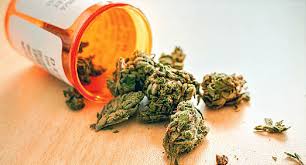

Marijuana is Medicine
With U.S finally legalizing marijuana in 29 states including Washington DC, more research has been conducted on the numerous health benefits the plant has to offer. The two most active chemicals in marijuana that are believed to have medical applications are cannabidiol (CBD) and Tetrahydrocannabinol (THC). Overall, marijuana has made its way into the medical field with overwhelming victory.
Chronic Pain
One of the most researched health benefits for marijuana is its treatment for chronic pain. One report done by the National Academies of Science, Engineering and Medicine studied more than 10,000 scientific studies, found that marijuana products or products with cannabinoids act on the same receptors in the brain that are effective in alleviating pain. Chronic pain affects more than 25 million adults in the U.S and is the leading cause of disability. The use of medical marijuana to treat chronic pain has been widely accepted in medicine and continues to help patients that suffer from many different illnesses that cause chronic pain.
Glaucoma
Treatment and prevention for glaucoma is also one reason states in the U.S approved of medical marijuana. According to the National Eye Institute marijuana decreases the pressure inside the eye. A study showed that smoking marijuana lowered intraocular pressure (IOP). However, marijuana only lowered IOP for several hours. Researchers hope to create a marijuana based compound that will last longer, research still continues.
Prevents cancer from spreading
In 2007 researchers at California Pacific Medical Center in San Francisco found that CBD may aid in preventing cancer from spreading by turning off a gene called Id-1. The researchers experimented with breast cancer cells that had high levels of Id-1. As a result the cells had decreased Id-1 expression and were less aggressive spreaders. In addition, The American Association for Cancer Research discovered that marijuana actually delays the growth of tumors in the brain, breast and lungs.
Slow the progression of Alzheimer’s disease
A study published in the journal of Molecular Pharmaceutics discovered that THC slows the formation of amyloid plaques by blocking an enzyme in the brain that forms them. These plaques kill brain cells that are associated with Azheimer’s. Early stages of research shows that a synthetic combination of CBD and THC can preserve memory. In addition, another study of a drug called dronabinol, a THC- based prescription was capable of reducing behavioral disturbances in dementia patients.
May prevent nightmares
Marijuana disturbs sleep cycles by interrupting the later stages of REM sleep, therefore dreams may not occur. Those who experience frequent nightmares and suffer from PTSD can benefit short term. Research into using synthetic cannabinoids, similar to THC showed a significant decrease in the number of nightmares in patients with PTSD.
Epilepsy
In a 2017 study it was discovered that the use of CBD resulted in fewer seizures among children with two types of epilepsy called Lennox-Gastaut and Dravet syndrome. The research found a 39% reduction in seizures. As a result in June 2018, the Food and Drug Administration (FDA) permitted the use of CBD medication called Epidiolex to treat those who suffer from these types of epilepsy.
Hepatitis C
The treatment for Hepatitis C infection can leave patients with major side effects, making many incapable of continuing treatment. These side effects usually include fatigue, nausea, muscle pains, loss of appetite, and depression, usually lasting for long periods of time. A study conducted by the European Journal of Gastroenterology and Hepatology found that 86% of patients using marijuana successfully completed their treatment. On the other hand, only 29% of the non-smokers completed theirs, most likely due to marijuana not being able to reduce the treatment’s side effects. It was also discovered that marijuana also helped the effectiveness of the Hepatitis C treatment. More than half of the Hepatitis C patients smoking marijuana showed low viral levels, while this was only seen in 8% of the non-smokers.
Protect the brain from concussions and trauma
According to the journal of Cerebral Cortex marijuana can aid in healing a concussion or other traumatic injury. An experiment conducted on mice showed that marijuana lessened the bruising of the brain and improved healing after a traumatic injury. Lester Grinspoon, a Harvard professor psychiatry and advocate of marijuana wrote an open letter to the NFL Commissioner Roger Goodall, stating that the NFL should stop testing players for marijuana and instead support research on marijuana ability to protect the brains of athletes.
Chemotherapy
Similar to patients with Hepatitis C treatments, marijuana can also help patients undergoing chemotherapy. Cancer patients going through chemotherapy experience side effects such as severe pain, nausea, vomiting and loss of appetite which can cause other health complications. According to the National Academies report marijuana can counteract these same side effects, especially with stimulating appetite, reducing pains and preventing nausea. These cannabinoid drugs typically contain THC.
May Lower Crime Rates
Much observational and research has gone into Colorado since it was the first state ever to tax and regulate the sale and private use of marijuana for non-medical purposes. According to the state’s department of revenue, Denver saw a reduction in violent crimes in the first 11 month and followed a similar pattern the year after. In addition, the Colorado Department of Transportation found a decline in traffic fatalities. Further research continues on crime rates as more states continue to legalize marijuana.
This list of benefits are only a small look into the benefits of marijuana. As legalization continues, research continues to make breakthroughs, especially in the medical field. Time will tell the true potential of the power of marijuana.
Don’t forget! Use code: SHIPFREE and receive free shipping (U.S. only) on your Twisty™ and Twisty™ accessories!
